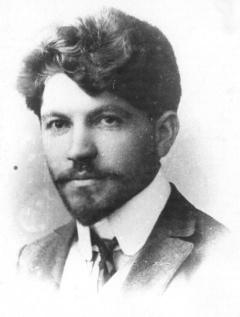Like many of his compatriots involved in communism, Alexander Bekzadian came to believe that socialism (morphed into communism) was the only salvation for Armenians, and did not view the issue of the Armenian liberation struggle as such. Led by the winds of world revolution, they called upon Armenians to fight against world imperialism along foreign socialists.
Bekzadian was born in 1879 in Shushi, the capital of Artsakh (Gharabagh), in the family of a judicial officer. Family well-being allowed him getting a brilliant education. In 1897 he graduated from the Royal School of Shushi, one of the best educational institutions in Transcaucasia at the time, and entered the School of Agriculture at the Polytechnic Institute of Kiev. In 1901 he became a member of the Social-Democratic organization of the University of Kiev, and two years later, the Bolshevik fraction of the Russian Social-Democratic Party. He was expelled from the university and the city for his political activities. He went straight to Baku, where his family had moved, and continued his activities within the local Bolshevik committee. His was a family of heightened political engagement; his sisters Mariam and Elena would later adopt the ideas of the Russian revolution, two of his brothers, Tigran and Hovsep, would be ARF members, and Ruben, member of the Social-Revolutionary party.
In 1905 he was arrested and imprisoned. However, he escaped and became an exile in Switzerland from 1906-1914 with an active political life as a sort of linchpin between the Caucasian Bolsheviks and the leader of the party, Vladimir Lenin. He entered the Law School of the University of Zurich, where he defended his doctoral dissertation in 1912.
Bekzadian was allowed to return to Russia in 1915, but was arrested when he rushed to Baku and remained in jail until the Russian Revolution of February 1917. After being released, he went back to Baku, where he became president of the provincial Food Committee. In 1918 he moved to the northern Caucasus and the following year he was a member of the Caucasian Committee of the Bolshevik Party. He was actively engaged in the struggle against the “bourgeois” Republic of Armenia and became one of the organizers of the failed Communist uprising of May 1920.
Bekzadian was a member of the Revkom, the Bolshevik committee that proclaimed the Sovietization of Armenia, and Popular Commissar of Foreign Affairs and Supplies in the first government of Soviet Armenia. In December 1920 and January 1921 he demanded from the Kemalist government of Turkey to stop the atrocities against the Armenian population in the areas occupied by Turkey and start negotiations to return Kars and Alexandropol to Armenia. However, the Armenian delegation led by Bekzadian was excluded from the negotiations started in Moscow in February-March 1921 by Turkish demand, giving the rebellion of February 1921 as pretext. He was reinstated in his position after the end of the rebellion in April. However, he failed to obtain any meaningful result at the time of the Treaty of Kars, which consecrated the loss of Kars, Ardahan, Mount Ararat, and Ani to Turkey in October 1921.
In 1922 Bekzadian abandoned Armenia and took a secondary position at the commercial mission of the USSR in Berlin for the next four years. From 1926-1930 he was designated deputy president of the Council of Popular Commissars of the Transcaucasian Federation and Commissar of Commerce. Afterwards, he returned to foreign affairs: from 1930-1937 he was Soviet ambassador, first to Norway until 1934, and then to Hungary. He abandoned his diplomatic activities in 1937 and returned to Moscow.
Like many veteran Bolsheviks, Alexander Bekzadian was a victim of the Stalinist persecutions. In 1938 he was charged with being a Trotskyite and having engaged in anti-governmental activities. After months of trial, he was executed on August 1, 1938, at the infamous Communarka shooting ground of the NKVD (a predecessor of the KGB), which functioned from 1937 to 1941 with more than 10,000 people killed and buried there. Like millions of Stalin’s victims, he was posthumously rehabilitated.
